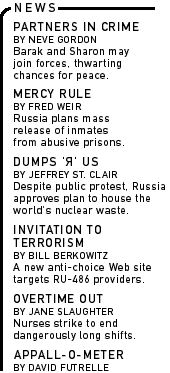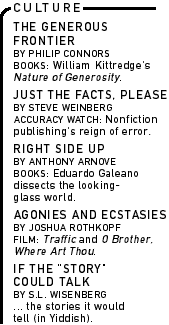

|

|

|

|
| |
|
|
|
Editor's Note: With this issue we are pleased to debut "Accuracy Watch," a new occasional feature in the culture pages, wherein investigative reporter Steve Weinberg scrutinizes the often hazy world of nonfiction publishing and its sometimes sketchy relationship with the facts. Readers are invited to send leads or complaints to weinbergs@missouri.edu. Books hold a special place in our culture. They represent expertise. They are the ultimate reference. When a student writes a term paper, she cites books without reservations. Professors do, too. Most authors take the books of previous authors as the truth. If it's between hard covers and controversial, it must have been fact-checked and lawyered, right? But disputes over the accuracy of nonfiction books arise frequently. Each is interesting in its own way, and a few receive enough publicity that the general readership becomes aware. What lots of readers fail to grasp, though, is that the individual controversies are far more numerous than might be logically expected. The fact is, the facts in nonfiction books are frequently not factual. It is tempting to dismiss the situation as owing to human nature. After all, authors are fallible. A few mistakes in a 500-page work of nonfiction are to be expected, right? Wrong. Authors, their editors and publishers should be working harder than most of them do to achieve accuracy. I say that as an author of nonfiction books for six publishers. During the two decades I've tracked the phenomenon, hundreds of books, written by talented (and sometimes not-so-talented) authors, published by usually responsible houses, have been criticized persuasively and publicly. That's good on one level: Debate is healthy for democracy. What's not so good is that many--probably most--readers have no idea any controversy exists. Authors frequently stonewall their critics. Publishers frequently do nothing to make corrections. When corrections do get made via new printings or paperback editions, the original flawed versions continue to sell in stores, sit on home shelves, circulate from libraries, and be cited in research papers and in future books--thus perpetuating the reign of error. Perhaps the biggest embarrassment in recent memory came from one of the majors, St. Martin's Press, which published J.H. Hatfield's exposé Fortunate Son: George W. Bush and the Making of an American President. Let's ignore that Hatfield forgot to tell his readers about his criminal past. Let's focus instead on the text, in which Hatfield overreaches his evidence again and again. A mundane but telling example: Diane King is mentioned as an interview source in multiple chapters. Hatfield never says who King is, how she knows anything about Bush, or precisely what she divulged. Well, it turns out King is the newsroom librarian for the daily paper in Midland, Texas. She says she photocopied articles from the newspaper for Hatfield--period. She never granted an interview, and had no detailed knowledge about Bush beyond what had appeared in the newspaper. Any experienced investigative reporter could have told the St. Martin's editors to jettison the manuscript. (After St. Martin's withdrew the book, a small, youthful publisher, Soft Skull Press, re-issued it. There is no indication that Soft Skull did anything to seriously check the accuracy of the book it resurrected.) Frequently, however, such embarrassments are produced by superb journalists, as in John Berendt's Midnight in the Garden of Good and Evil: A Savannah Story. It became one of the bestselling narrative nonfiction books of all time when published by Random House in 1994. Berendt has excellent research skills and is a fine stylist. But he chose to fictionalize scenes, and Random House published those scenes as fact. Sources made compelling claims of misrepresentation, too. Hatfield at least suffered disgrace, and inside St. Martin's there was a shake-up of sorts. Berendt and those involved at Random House managed to elude disgrace, sending a signal that accuracy is of little concern if the book earns enough money. Sebastian Junger came close to emulating the best--and the worst--of Berendt with A Perfect Storm. Junger's 1998 bestseller contains an inexcusable number of factual errors as well as scenes whose verisimilitude have been questioned. To the credit of Junger and publisher W.W. Norton, the factual errors got corrected in later printings. But many books sell too sparsely to warrant a new printing. Needless to say, the errors live on in the early printings, despite Norton's efforts after the fact. (Disclosure: I am currently writing a book under contract to W.W. Norton.) To name a few other prominent authors and publishers embroiled in controversies over accuracy: Gail Sheehy, Hillary's Choice (Random House); John Cornwell, Hitler's Pope: The Secret History of Pius XII (Viking); Anthony Summers, The Arrogance of Power: The Secret World of Richard Nixon (Viking); Richard Ben Cramer, Joe DiMaggio: The Hero's Life (Simon & Schuster); Patrick Tierney, Darkness in El Dorado: How Scientists and Journalists Devastated the Amazon (W.W. Norton); and a bunch of Clinton scandal books. It's possible that those pointing out errors are themselves in error; in any case, I have been pleased to locate detailed responses from some of the authors accused of carelessness.
|

